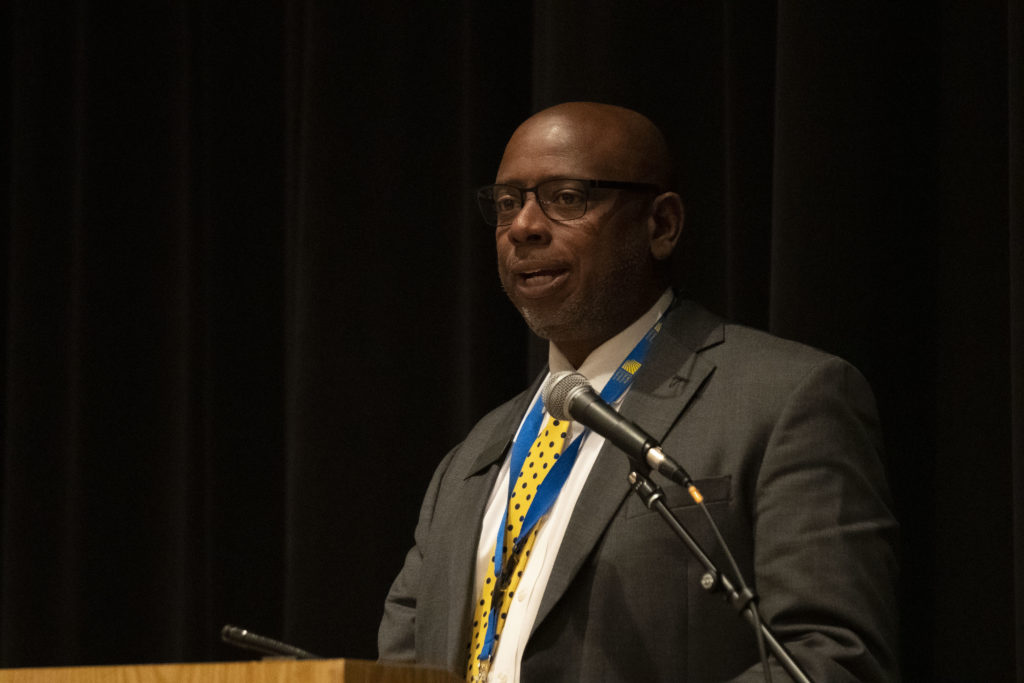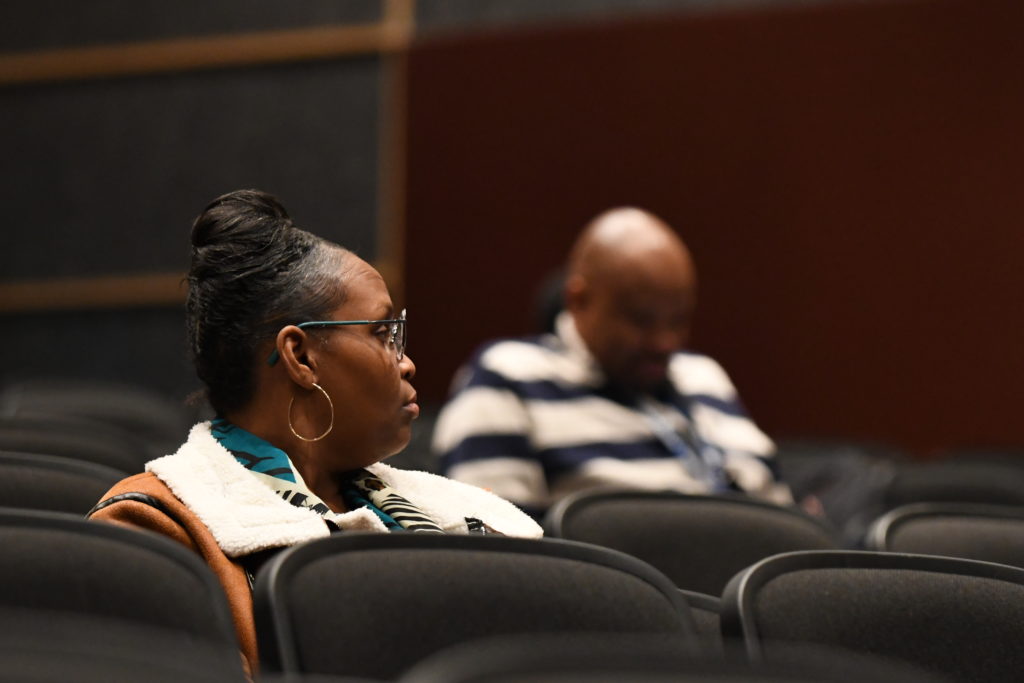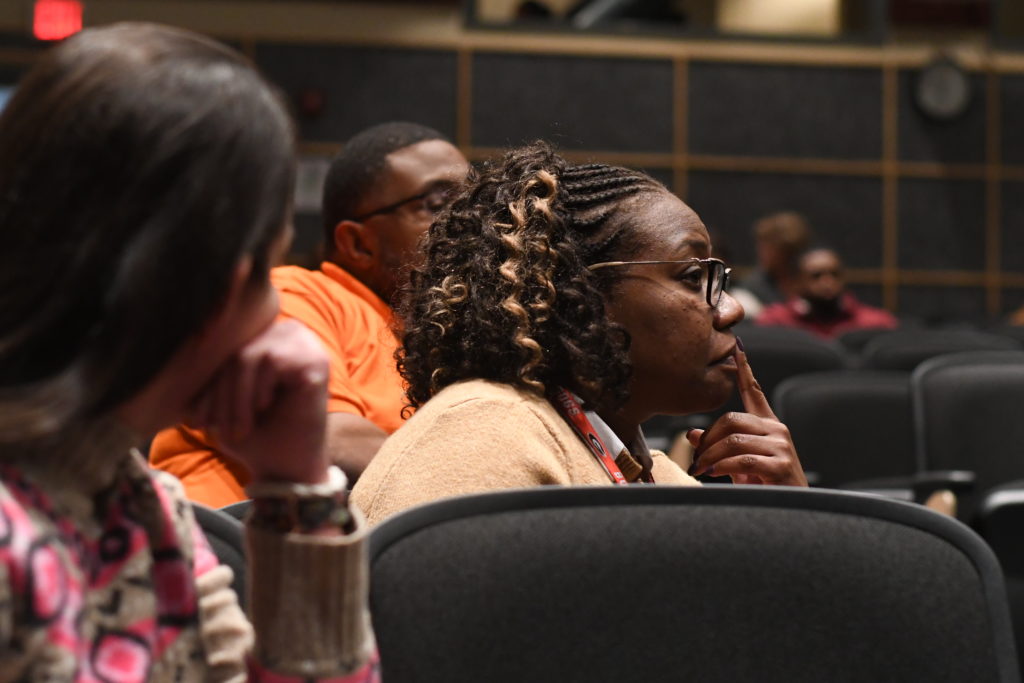
Talk of the town: Dr. Robbie Hooker offers insight
Community members gathered in the Cedar Shoals auditorium on Nov. 17 for the fourth of a series of six town hall meetings with Clarke County School District Superintendent Dr. Robbie Hooker.
Just five weeks into his tenure, Hooker emphasized community and relationships as well as offering his thoughts on pressing issues. Every question he fielded circled back to engagement and the importance of forming strong bonds between students, teachers and parents.
“It’s like football players; not everyone starts out a five star player. It’s about the coaching and expectations that coaches have for them to be better. We have to take that same mentality as leaders, as principals and as district office personnel, to ensure that we are coaching our teachers to get better, which will improve student learning,” Hooker said.
Staying on theme with his bonded community approach, Hooker had a unique stance on how weapons and drugs should be handled within the district. Instead of installing metal detectors at every door, he reiterated that it’s not the detectors that will prevent weapons, but rather having the courage to speak up against violence or potential harm.
“We have to count on each other to be safe in our buildings,” Hooker said. “That’s how we have been alerted to things that have happened in our schools this year. We have students and adults who have seen something and said something.”
When asked if he had a solution about the distraction that cell phones cause in schools, Hooker said students should utilize pouch-storage for their devices before class starts.
“60% or more of the incidents that we have in our schools are due to social media postings,” Hooker said.
Claudria Hardman, mother of three Cedar Shoals students, expressed her concerns about the education that her children are receiving. She explained that the behavioral issues in the classroom prohibit her freshman from learning.
“Even if some children get disciplined, the next day it’s the same thing over and over again and if you try to engage them, you see a push back,” Hardman said.
Hooker assured Hardman that as a leader in the community and schools, it is his job to oversee administration in order to have successful classroom management.
“That’s on me. We’re going to get it right, and we’re going to get it right before January,” Hooker said. “Your child comes to this system to get an excellent education. You’ve gone through the system, you see how successful you are, and your other kids are doing well. Your child shouldn’t suffer. Hold me to that.”
Hooker elaborated on his hopes for behavioral turn-around by emphasizing the role that good teacher-parent relations play in the lives of students.
“I wish that every teacher — before the kids walk into their classroom — would call every parent and start that relationship. Engage parents in the learning, and encourage them to come out and see what actually happens in the classroom,” Hooker said.
After the town hall concluded, Hardman expressed her respect and support for Hooker along his journey as superintendent, but she was still hesitant about the actuality of his statements.
“My questions were answered, but now it’s time for us to put it into action to see if everything will come to fruition,” Hardman said. “I don’t want them (her children) to come to school and be afraid because sometimes they are and that’s sad.”
Another parent, Janet Frick, also communicated her apprehensiveness about learning advancements and the graduation rate within the district. She questioned Hooker’s future goals for the district and how he plans to resolve the issue.
“From my perspective, as a parent, I see a number of concerns – the tremendous disparities in terms of performance among kids,” Frick said. “I came to a senior parent meeting, and the percentage of kids who are at strong risk of not being able to graduate was alarmingly high.”
Frick was not the only community member to doubt student progress. Another attendee noted the delayed learning that the pandemic caused, wondering how kids would be able to catch up and stay on track simultaneously.
Hooker heeded her concerns but ultimately took a realistic stance on not regressing the students any further. He preached the importance of fitting the missed material in when one can, but otherwise, sticking to grade appropriate content.
“It’s important for us to not just go back and teach what they missed, but instead teach them the current curriculum,” Hooker said. “We are working to come up with ways to incorporate teaching those gaps.”
Stacy Dean, a former Cedar security guard and current Family Connections employee, voiced his disapproval of the lack of retirement packages for CCSD workers. Hooker’s stance on heavily investing in employees made Dean question the reality of not being able to provide adequate retirement options.
“I don’t buy that because they raise school taxes every year. If taxpayers pay thousands of dollars each year, why can’t they invest in a good retirement package?” Dean said.
Hooker did not directly respond to the issue, but Byron Schueneman, Chief Financial Officer for CCSD, said that they are “not allowed” to offer TRS but instead offer a 403(b) plan – a tax free retirement plan until money is withdrawn.
While Hooker had responses to most questions thrown his way, he was unfamiliar with the unnatural zoning that CCSD experiences. One audience member commented on the Gaines School Elementary students being bused in from Nellie B. He also inquired about the subsequent racial equity issues that stem from zoning.
Hooker did not give a formal answer to the zoning issue, but he did address the racial equity portion of the question.
“We have to have teachers and administrators who believe in all of our kids,” Hooker said. “We should be teaching our kids to think critically no matter what level they are and we should be challenging them.”









